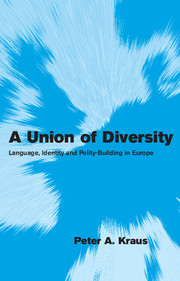Book contents
- Frontmatter
- Contents
- List of Tables and Figure
- Preface
- Acknowledgments
- A Union of Diversity
- 1 Introduction: The dynamics of European integration
- 2 The European Union's democratic deficit and the search for a European demos
- 3 The identity of a multinational polity
- 4 Language and politics: A challenge for Europe
- 5 The language question in the institutional complex of the European Union
- 6 Political communication in the transnational civil society
- 7 Recognition, self-determination and integration in a union of diversity
- References
- Index
- Titles in the series
4 - Language and politics: A challenge for Europe
Published online by Cambridge University Press: 22 September 2009
- Frontmatter
- Contents
- List of Tables and Figure
- Preface
- Acknowledgments
- A Union of Diversity
- 1 Introduction: The dynamics of European integration
- 2 The European Union's democratic deficit and the search for a European demos
- 3 The identity of a multinational polity
- 4 Language and politics: A challenge for Europe
- 5 The language question in the institutional complex of the European Union
- 6 Political communication in the transnational civil society
- 7 Recognition, self-determination and integration in a union of diversity
- References
- Index
- Titles in the series
Summary
Whenever it comes to defining ‘hard’ criteria of cultural heterogeneity in Europe's multinational constellation, the terrain of language is almost unavoidably brought into focus. At this point, suffice it to say that at present, after the first two rounds of eastern enlargement and the admission of 10 new members in 2004 and 2 new members in 2007, 27 member states within the European Union (EU) make for 23 languages which all enjoy formal equality. In addition, there is a long list of languages which have an official or semi-official character at the subnational level. Language may well be regarded as the principal factor of cultural differentiation in the EU. Accordingly, the imperative to respect cultural diversity, which plays a pivotal normative role in EU treaties and declarations, becomes in the first instance an imperative to respect linguistic diversity.
As a salient differentiating feature within Europe, language is at the same time a differentiating factor of a quite special kind, since the ability to speak, which is a constitutive attribute of the human species, finds concrete expression in manifold forms. Humanity speaks, yet it speaks in different tongues. Since the universality of language (in the singular) and the difference of languages (in the plural) are parallel phenomena, the linguistic medium is a symbol of cultural diversity with peculiar properties. Ultimately, the particularism of the mother tongue, which in the case of individuals with a multilingual socialization may become the particularism of a limited repertoire of ‘own’ languages, is a particularism common to all people in different ways.
- Type
- Chapter
- Information
- A Union of DiversityLanguage, Identity and Polity-Building in Europe, pp. 76 - 110Publisher: Cambridge University PressPrint publication year: 2008

